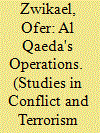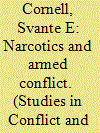|
|
|
Sort Order |
|
|
|
Items / Page
|
|
|
|
|
|
|
| Srl | Item |
| 1 |
ID:
076941


|
|
|
|
|
| Publication |
2007.
|
| Summary/Abstract |
This article examines the traditional political and economic factors that have been purported to explain the prevalence of insurgency. It tests the following hypotheses at the subnational level in Colombia: guerrilla violence is positively associated with exports; higher levels of insurgency are associated with low levels of GDP per capita or negative growth rates; guerrilla violence emerges in the context of weak state presence; and higher levels of state repression are associated with higher levels of insurgent violence. The analysis utilizes a zero-inflated negative binomial to capture dynamics of both intensity and onset of violence. The econometric analysis is supplemented with cartographic visualization and qualitative analysis.
|
|
|
|
|
|
|
|
|
|
|
|
|
|
|
|
| 2 |
ID:
076942


|
|
|
|
|
| Publication |
2007.
|
| Summary/Abstract |
In recent years, Al Qaeda succeeded in perpetrating several terrorist attacks that were successfully calculated and executed. Each operation may be considered to be analyzed as a project. This article analyzes the events taken by Al Qaeda prior to their operations, focusing on planning, controlling, and decision-making processes, using common tools from the project management area. This unique approach enables an understanding of the operational aspects of Al Qaeda and the managerial processes that its leaders were focused on. It was found that Al Qaeda's greatest managerial strength lies in human resource management, which includes team members recruiting, developing a clear organizational structure, team developing and team members motivating. Al Qaeda's greatest weakness lies in time management, resulting with many operations' schedule delays
|
|
|
|
|
|
|
|
|
|
|
|
|
|
|
|
| 3 |
ID:
076939


|
|
|
|
|
| Publication |
2007.
|
| Summary/Abstract |
The link between armed conflict and the production and trafficking of illicit drugs has been much noted in the popular literature, and recent research tentatively indicates a link between lootable resources, including narcotics, and conflict duration. Yet the specific dynamics of the linkage between narcotics and conflict remain poorly understood. Evolving theory on the link between organized crime and terrorism enhances and supplements the debate on economic incentives in civil war, proposing mechanisms whereby insurgent groups interact with narcotics production - a crime-rebellion nexus. Studies of nine major narcotics-producing areas indicates strong support for this nexus. Rather than generating or being generated by drug cultivation, armed conflict qualitatively and quantitatively transforms existing drug cultivation. Importantly, armed conflict is itself deeply affected by the narcotics industry, which tends to strengthen the capacity of insurgent movements while weakening that of the state. A momentous aspect of the crime-rebellion nexus is the effect that the drug industry tends to have on the motivational structures of insurgent groups: criminal involvement in some instances creates an economic function of war and vested interests in the continuation of armed conflict. This has substantial implications for strategies to resolve armed conflict involving the production and trafficking of illicit drugs
|
|
|
|
|
|
|
|
|
|
|
|
|
|
|
|
| 4 |
ID:
076940


|
|
|
|
|
| Publication |
2007.
|
| Summary/Abstract |
Extreme religious interpretations of the Quran and the movement of Islamic Revivalism influence the emergence and progression of violent Jihad in contemporary times. Islamic "terrorists" are able to legitimize their movement as an act of violent Jihad permitted by the Quran essentially because of religious sanctions that permit the use of violence as an act of defense and to preserve the will of God in Islamic communities. The Quran systematizes this use and relates it to other aspects of the Shariat through its discourse on revivalism. Based on the Quranic principle of ijtihad, terrorists emphasize the Quran's tenets on violence and revivalism in their religious interpretations and present it as a legitimate premise for the use of excessive aggression. According to ijtihad Muslims can interpret and determine the extent of their Islamic practices individually as long as these are directed toward ensuring the will of God in an Islamic community. Thus terrorists use ijtihad to emphasize Quranic clauses that sanction the use of violent Jihad as a method ordained by God to preserve the Shariat in an Islamic community. The manner in which terrorists use ijtihad to contextualize geopolitical factors as a cause for violent Jihad is determined by their extreme interpretations of the Quran. These interpretations also determine the extent of violence used in a Jihad for religious amelioration. The religious legitimacy of this violence prevails until the cause and course of violent Jihad correlates with the Quran's discourse on violence and revivalism. In contemporary times an extreme interpretation of the movement of Revivalism1 that is inspired by "revivalism" also provides an organized premise for Islamic terrorism. When implemented, this causes variations within specific geopolitical conditions and in different Jihadi groups. However a common understanding of religious doctrines determines the extent of Revivalism in Islamic communities because this movement relies heavily on the Quranic discourse for its existence. Thus, the religious basis for Islamic terrorism is primarily found when extreme interpretations of the Quran's tenets on violence and revivalism are directed toward obtaining an equally radical version of Revivalism in specific geopolitical conditions. In this manner, extreme Quranic and Revivalist interpretations ensure the ideological persistence of Islamic terrorism as a religious effort to preserve the will of God in an Islamic community. The aim of this article is to show the manner in which religion can cause the emergence of Islamic violence as it is known today. The discourse on Islamic violence and counterterrorism needs to be urgently studied given the numerous instances of violent Jihad in contemporary times. Many writings on Islamic violence and statements released after an act of Islamic violence allude to the impact of religion on violent Jihad, but they rarely explore it or present a premise for its existence. This exploration will be conducted based on research of the author's on the Kashmir crisis and the insurgency in it. Thus, examples from insurgency in Kashmir will be used on occasion to illustratively develop this argument. In his book The Clash of Civilizations, Samuel Huntington states that a theory must be causal and simple. Using the words of Thomas Kuhn, he explains that "to be accepted as a paradigm [it] must seem better than its competitors but it need not, and in fact never does, explain all the facts with which it can be confronted."2 Furthering such simplicity and exploration, will be the central effort of this discourse. The sources for this exploration will be mainly derived from theoretical and practical understandings of terrorism, Islamic religion and theology, and the movement of Islamic Revivalism. A comparison between Islam and other religions will not be presented when evaluating the impact of Islam on violent Jihad. It will essentially present religious premises for violent Jihad
|
|
|
|
|
|
|
|
|
|
|
|
|
|
|
|
|
|
|
|
|